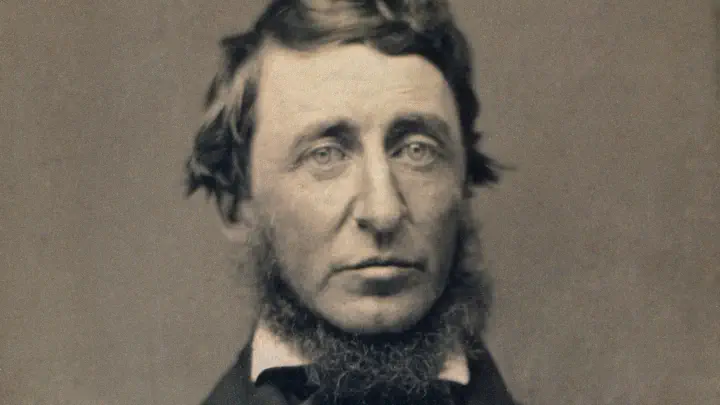
HENRY DAVID THOREAU, a new, three-part, three-hour film directed by Erik Ewers and Christopher Loren Ewers, and executive produced by Ken Burns and Don Henley, will air on March 30 (Episodes 1 and 2) and March 31, 2026 @ 9:00 p.m. ET (check local listings), PBS announced today. A trailer for the film appeared following Episode 5 of Burns’s THE AMERICAN REVOLUTION last night. You can see it here.
HENRY DAVID THOREAU examines the life and work of the 19th-century writer in the context of antebellum New England and the larger United States, as well as through the universal themes he focused on in his writings: an individual’s relationship to the state, how to live an authentic life, our connection to nature, and the impact of race on American life. Set against the political and social tensions of the mid-19th century, the film traces Thoreau’s journey from his early days in Concord, Massachusetts to his deep engagement with the moral crises of his time, including industrialization, slavery, war, and environmental degradation. Through his essays, journals, and landmark works such as Walden and Civil Disobedience, he became an inspiration for generations of writers, thinkers, and activists.
The film draws on a rich collection of archival materials, newly filmed cinematography in Concord and beyond, and interviews with scholars, writers, and environmentalists. Among the people featured in the film are Pico Ayer, Douglas Brinkley, Lois Brown, Kristen Case, Laura Dassow Walls, Clay Jenkinson, Robin Kimmerer, J. Drew Lanham, Bill McKibben, Michael Pollan, Rebecca Solnit, and more.
HENRY DAVID THOREAU is narrated by George Clooney and voices are provided by Ted Danson (Ralph Waldo Emerson), Tate Donovan (William Ellery Channing), Jeff Goldblum (Henry David Thoreau), and Meryl Streep (Lidian Emerson, Margaret Fuller, Mary Merrick Brooks, and Maria Thoreau).
“Thoreau’s insistence that conscience must guide citizenship, and that solitude can be a source of strength, continues to speak directly to our time,” said executive producer Ken Burns. “He challenged Americans to ask hard questions about who we are and what kind of society we want to build, a challenge that remains as urgent today as it was in his day. But perhaps most importantly, he asked us to stop and to pay attention to the world around us.”
Executive producer Don Henley, founding member and lead singer of the Eagles and a longtime advocate for environmental causes, added: “Thoreau was not only a pioneering environmentalist, but also a prophetic philosopher who believed in the power of individual action. His writings have been a guiding force throughout my life. This film honors his legacy while asking what it means to live with purpose in the 21st century.”
Henley, founder and chairman of The Walden Woods Project, has long worked to preserve the physical and philosophical legacy of Thoreau. Established in 1990, the organization led a successful campaign to protect nearly 200 acres of threatened land surrounding Walden Pond and has since become a national leader in conservation and environmental education. The Walden Woods Project promotes Thoreau’s writings and values through research, public programming, and efforts to engage new generations in discussions around environmental stewardship and civic responsibility.
HENRY DAVID THOREAU is the latest in a long line of PBS documentaries that explore the American experience through the lives of extraordinary individuals. As the nation prepares to mark the 250th anniversary of its founding, the film offers a timely meditation on democracy, nature, and the responsibilities of citizenship. It is also the first full-length documentary devoted to Thoreau, one of the country’s greatest writers and among the most enduring thinkers and artists of what came to be known as the Transcendentalist Movement in America.
“Thoreau famously retreated into nature not to escape the world but to better understand it,” the director Erik Ewers said. “His writing about the wild and nature remains so vibrant because he was acutely aware of how the surrounding countryside was teetering on the edge of industrialization. He believed strongly that we have a connection to the landscape and nature and must remain grounded to fully experience what it means to be human.”
Equally, Thoreau was very active in the most pressing political and social issues of the day, especially abolitionism and slavery. He lectured and wrote in support of freedom for the enslaved, defied the Fugitive Slave Act, and defended the right of citizens to resist unjust laws. His insistence on moral action would influence later generations of reformers, from John Muir and the early conservation movement to Mahatma Gandhi and Martin Luther King, Jr. The film examines the universal nature of many of his writings, and his concerns about humanity and the “quiet desperation” of life by also reflecting on current events and challenges, through footage focused on other periods in American history and social and cultural issues today.
“Thoreau’s popularity and writings are often presented as simplified statements about wellness or simple living,” said the director Christopher Loren Ewers. “To the contrary, they provide deep, thoughtful investigations that combine an appreciation for nature and the environment with a keen sense of moral responsibility. Not only is he one of the first great nature writers in American literature but he’s also an acute observer of the times.”
The film illuminates the vibrant intellectual and political community that shaped and nurtured Thoreau. Concord, Massachusetts in the mid-19th century was a crucible of new ideas about religion, nature, politics, and social reform. Thoreau moved among the towering figures of American thought, such as his mentor Ralph Waldo Emerson, Margaret Fuller, Bronson Alcott, Frederick Douglass, the radical abolitionists of Boston, and the even more controversial John Brown, engaging in debates that would define the era.
Viewers will also encounter the broader world of reform and resistance in which Thoreau participated. The film situates his life within the ferment of antebellum America: the fight against slavery, the rise of women’s rights, the impact of industrialization on New England’s landscape, and the continued displacement of Native peoples. Thoreau’s journals reveal how these forces shaped his thinking and his art.
At the same time, the series explores the Transcendentalist movement, of which Thoreau was a central figure. Transcendentalism’s emphasis on self-reliance, spiritual intuition, and the moral dimension of everyday life informed Thoreau’s experiments at Walden Pond and his lifelong quest to live deliberately. The film draws out how these ideas still animate debates about the environment, citizenship, and individual conscience.
Ultimately, HENRY DAVID THOREAU presents a portrait of a man both rooted in his time and speaking far beyond it. By placing his life and writings within the great moral struggles of the 19th century, the film underscores why Thoreau endures as a guide to the tensions and possibilities of American democracy – offering wisdom and provocation as the nation approaches its 250th anniversary.
HENRY DAVID THOREAU is a Ewers Brothers Production, in partnership with Florentine Films and WETA Washington, D.C. Directed by Erik Ewers and Christopher Loren Ewers. Written by David Blistein. Produced by Julie Coffman and Susan Shumaker, Producers Christopher Loren Ewers and Erik Ewers. Director of Photography Christopher Loren Ewers. Edited by Erik Ewers and Ryan Gifford. Co-Produced by Cauley Powell. Original Music Score by David Cieri. Narrated by George Clooney. Voice of Thoreau by Jeff Goldblum, and other voices by Ted Danson, Meryl Streep and Tate Donovan. The executives in charge for WETA are John F. Wilson (posthumously) and Kate Kelly. Executive Producers are Ken Burns and Don Henley.
Major funding for HENRY DAVID THOREAU was provided by The Better Angels Society and its members: The Keith Campbell Foundation for the Environment and Mark A. Tracy. Major funding was also provided by Jeff Skoll, The Mansueto Foundation, Tyson Foods, Inc., and the Tyson Family Foundation. Additional funding was provided by The Arthur Vining Davis Foundations, The Neil and Anna Rasmussen Foundation, Roxanne Quimby Foundation Inc and Elizabeth Kenny.
About WETA
WETA is the leading public broadcaster in the nation’s capital, serving Virginia, Maryland and the District of Columbia with educational initiatives and high-quality programming on television, radio and digital. WETA Washington, D.C., is the second-largest producing station for public television, with news and public affairs programs including PBS News Hour and Washington Week with The Atlantic; films by Ken Burns and Florentine Films, such as The American Buffalo and The American Revolution; series and documentaries by Dr. Henry Louis Gates, Jr., including Finding Your Roots with Henry Louis Gates, Jr. and Great Migrations: A People on the Move; performance specials including National Memorial Day Concert and A Capitol Fourth; and health content from Well Beings, a multiplatform campaign. Sharon Percy Rockefeller is president and CEO. More information on WETA and its programs and services is available at weta.org. Visit facebook.com/wetatvfm on Facebook.

![New Trailer of Upcoming Drama “Memory of a Killer” Starring Patrick Dempsey and Michael Imperioli – Premiering This January on FOX [VIDEO]](https://mortystv.com/blog/wp-content/uploads/2025/11/Memory-of-a-Killer-350x250.webp)

![“TMZ Presents: TMZ’s Most Outrageous Moments of 2025” Premieres Tuesday, December 2 @ 9PM/8c on FOX [VIDEO]](https://mortystv.com/blog/wp-content/uploads/2025/11/TMZs-Most-Outrageous-Moments-of-2025-350x250.webp)
![We TV Releases Exclusive Sneak Peek of the New Season of “Love During Lockup” [VIDEO]](https://mortystv.com/blog/wp-content/uploads/2025/11/Love-During-Lockup-350x250.webp)
![Watch the Trailers – “OWN for the Holidays” Returns with Three Festive New Movies [VIDEO]](https://mortystv.com/blog/wp-content/uploads/2025/11/Very-Merry-Mystery20251120c-feat-350x250.webp)




